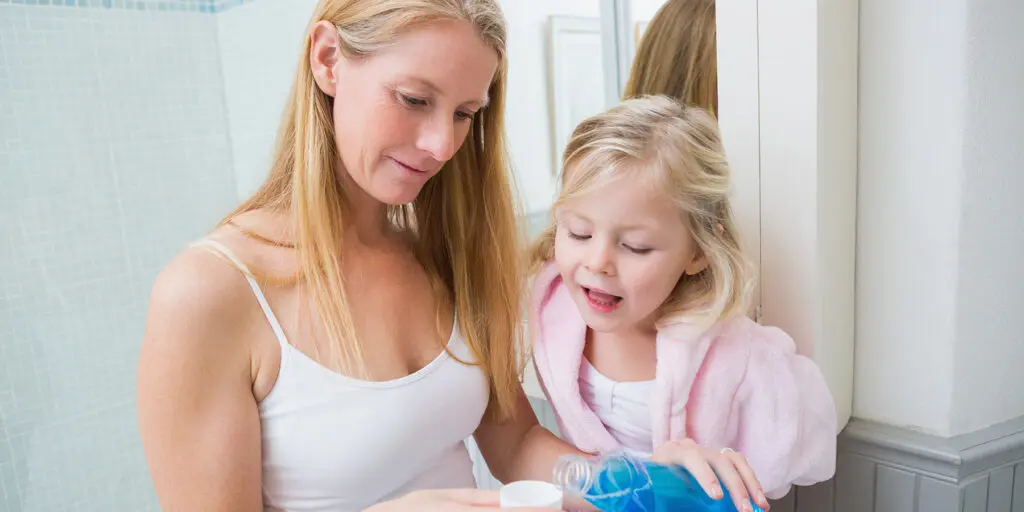Reviewed by Paul Rubin
Mouthwash is often seen as a quick way to freshen breath or boost dental hygiene, but is it right for kids? Many parents wonder if mouthwash is safe for children or whether it’s even necessary. Understanding when mouthwash helps—and when to skip it—can make it easier to decide what is best for your child’s smile.
Table of Contents
Key Takeaway
Kids can use mouthwash safely once they are old enough to swish and spit, usually around age six. Choose an alcohol-free, fluoride rinse designed for children and use it under parental supervision for the best results.
Should Kids Use Mouthwash?
Before adding mouthwash to your child’s daily routine, it’s important to know when it actually helps. Most children don’t need mouthwash until they can reliably brush and spit without swallowing, usually around age six.
Pediatric dentists recommend mouthwash mainly for children who:
- Have a higher risk of cavities
- Wear braces or orthodontic appliances
- Struggle with hard-to-reach plaque areas
- Need extra fluoride protection
If your child meets these criteria, a fluoride mouthwash approved by the American Dental Association (ADA) can provide an added layer of protection against decay.
When to Skip Mouthwash
Not all kids are ready to handle mouthwash safely. Before you introduce it, consider these situations where it’s best to skip or wait:
- Under age six: Younger kids often swallow the rinse, which can expose them to too much fluoride.
- If your child can’t spit properly: Swallowing mouthwash can cause nausea or upset stomach.
- If your child already uses fluoride toothpaste and drinks fluoridated water: Too much fluoride can lead to mild discoloration known as fluorosis.
- If mouthwash irritates gums or tongue: Alcohol-based rinses may sting or dry out the mouth.
If you’re unsure, ask your pediatric dentist at their next checkup whether your child needs mouthwash or if brushing and flossing are enough.
Benefits of Mouthwash for Kids
When used correctly, mouthwash can be a safe and effective addition to daily hygiene.
Here’s what it can do for your child’s smile:
- Freshens breath: Helps neutralize odor-causing bacteria and food particles.
- Strengthens enamel: Fluoride rinses help protect against acid attacks and cavities.
- Fights plaque buildup: Rinses can reach places a toothbrush might miss.
- Soothes gums: Some formulas include ingredients to reduce early gum inflammation.
Always supervise your child while they rinse and teach them to swish for 30 seconds before spitting it out completely.
What to Look For in Kids Mouthwash
Picking the right rinse can make a big difference in safety and comfort.
Here’s how to choose wisely:
- Look for ADA-approved products: They meet safety and effectiveness standards.
- Opt for alcohol-free formulas: These are gentler on developing gums and tissues.
- Use fluoride mouthwash (when recommended): It helps prevent cavities in children at higher risk.
- Avoid whitening or “antiseptic” rinses: These are meant for adults and may be too strong for kids.
- Pick a mild flavor: A gentle mint or fruity option makes rinsing more enjoyable.
Ask your pediatric dentist for recommendations at your child’s next visit.
Teaching Kids How to Use Mouthwash Safely
Introducing mouthwash can be a learning moment for healthy habits. Here’s how to guide your child:
- Start small: Use just a capful (about 10 mL).
- Show how to swish and spit: Practice with water first.
- Supervise every use: Keep mouthwash out of reach between uses.
- Set a routine: Encourage rinsing once a day after brushing, usually before bed.
Once your child can rinse confidently without swallowing, they can make mouthwash a regular part of their oral care routine.
Lonestar Kids’ Dentistry: Your Partners in Oral Health
Whether you are adding mouthwash to your child’s routine or just want to make sure their teeth are developing well, we’re here to help. Our pediatric dental team offers preventive care, gentle cleanings, and personalized guidance for every stage of your child’s smile.
To book an appointment at our pediatric dental office in Prosper, TX, call (469) 228-4402, request an appointment online, or visit us at 240 S. Preston Road, Suite 10 Prosper, TX 75078.
📍Other locations
Lonestar Kid’s Dentistry in Frisco, TX
Lonestar Kid’s Dentistry in McKinney, TX
FAQ
Most children can start using mouthwash around age six, once they can swish and spit without swallowing. Younger children should avoid it to prevent accidental ingestion and to build good oral hygiene habits first.
Yes, if recommended by your dentist and your child uses it properly. A daily fluoride rinse can strengthen enamel, freshen breath, and help prevent tooth decay as part of a consistent oral hygiene routine.
Mouthwash can help clean around brackets and wires where brushing might miss. It can also reduce bad breath caused by trapped food particles. Ask your dentist which rinse works best for orthodontic care.
If your child swallows a small amount, monitor them for nausea or stomach upset. For larger amounts, contact your pediatrician or poison control right away. Keeping mouthwash stored safely out of reach is an important part of a healthy oral hygiene routine.
